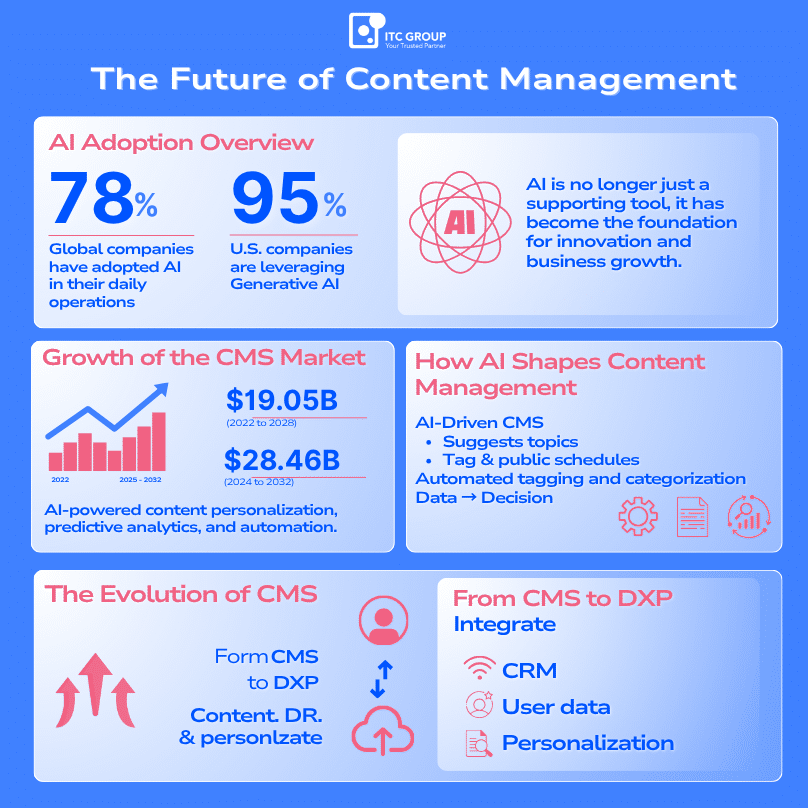









In today’s digital-first world, businesses are accelerating their digital transformation. They are creating more content than ever, across websites, apps, email campaigns, and social platforms. Managing all this content manually is inefficient. It also increases operational risks. That’s why content management software has become essential for modern organizations.
A CMS allows users to create, manage, store, and publish digital content with ease. It requires no coding skills. The platform serves as the backbone of digital marketing, communication, and brand consistency. Unlike basic website builders that focus only on design, a CMS provides a complete ecosystem for collaboration and scalability. It also supports workflow automation. Popular examples include WordPress, HubSpot CMS, Sitecore, and Contentful.
Content management software operates through three main stages: Create, Manage, and Publish. During the Create phase, authors and editors can easily build pages, posts, or multimedia content using intuitive interfaces designed for all skill levels. In the Manage stage, teams can organize, edit, and control permissions within a centralized workspace, ensuring that everyone stays aligned and workflows remain seamless.
This unified process enables marketing, IT, and design teams to collaborate efficiently while retaining full control over content quality, governance, and brand identity. Learn more about how improving Your Releases can help enhance consistency, accelerate delivery, and maintain high-quality standards across every digital touchpoint.

As a result, a robust CMS enables teams to work seamlessly together, from writers and editors to approvers and designers within one centralized system. Moreover, it automates content approvals, manages version control, and regulates access permissions, e
By minimizing dependence on IT teams for everyday updates, content management software allows marketers to move faster and stay agile. It centralizes data, reduces duplication, and minimizes human errors all while helping organizations streamline workflows and boost efficiency and adapt faster through agile development.
Content management software also improves discoverability and user experience. It provides built-in SEO tools for managing metadata, schema, and URLs ensure your content is structured for better search performance. Consistent messaging across all digital channels builds stronger trust and engagement with customers.
Artificial Intelligence is no longer an experimental tool, it has become a fundamental driver of business growth and innovation. According to Exploding Topics (2025), nearly 78% of global companies are already using AI in their daily operations, reflecting its growing importance across industries. In the content management space, this shift is even more pronounced as AI continues to redefine how organizations create, organize, and deliver digital experiences.
The global Content Management System (CMS) market is expanding rapidly alongside AI adoption. Reports from BusinessWire project the CMS market to grow from US $19.05 billion in 2022 to US $27.48 billion by 2028, while Verified Market Research estimates an even steeper rise from US $10.44 billion in 2024 to US $28.46 billion by 2032, marking a compound annual growth rate (CAGR) of over 15%.
As a result, this acceleration is largely driven by AI integration, particularly in content personalization, predictive analytics, and automation. As highlighted by Bain & Company (2024), 95% of U.S. companies are already leveraging Generative AI, underscoring a future where content strategies are powered by machine intelligence. Together, these figures point to one conclusion: AI is not just shaping the future of content management; it is the foundation of it.
AI integration is transforming how organizations handle digital content. Modern CMS platforms leverage AI to recommend topics, generate drafts, and optimize publishing schedules. They can automatically categorize and tag content based on relevance or performance metrics, helping teams make smarter, data-driven decisions.
Today’s CMS is evolving into a Digital Experience Platform (DXP), connecting content with CRM systems, user behavior analytics, and personalization engines. This shift enables organizations to create richer, more tailored experiences that resonate across every digital touchpoint.
With the rise of headless CMS, businesses can now deliver content seamlessly to any platform, from websites and mobile apps to IoT devices and chatbots all from a single centralized hub. This architecture ensures omnichannel consistency while giving developers greater flexibility, especially as Generative AI continues to redefine how content is created, managed, and personalized.

At ITC Group, we support businesses through the full CMS journey from strategic consultation to implementation of digital transformation. Moreover, we will help you choose the right platform (WordPress, HubSpot, Strapi, etc.) and ensure it’s scalable, secure, and seamlessly integrated with your existing systems such as CRM, ERP, and cloud infrastructure. Help your business have a digital transformation to grow up.
Our team delivers customized CMS solutions designed to fit your business operations. We build tailored approval workflows that streamline content publishing, integrate real-time analytics dashboards for better performance tracking, and connect your CMS with marketing automation and email platforms through seamless API integrations, ensuring efficiency and consistency across all digital touchpoints.
We provide continuous performance monitoring, 24/7 technical support, and comprehensive training to help your internal teams manage and scale content efficiently. By leveraging Digital Content Management strategies, ITC Group ensures your business maintains streamlined workflows, consistent brand messaging, and long-term digital growth.
Ultimately, choosing the right content management software in the digital transformation field isn’t just a smart decision for today. Instead, it represents a long-term investment in your company’s digital future. In fact, in an era where information evolves constantly, a robust CMS empowers your business to adapt, achieve efficiency, and maintain consistency — all of which ultimately lead to growth. At the same time, ITC Group helps organizations turn content management into a competitive advantage by offering tailored solutions that support your goals, scale with your needs, and deliver lasting value in a fast-moving digital landscape.
1. What is the difference between a CMS and a website builder?
On the other hand, a CMS manages all content creation, workflow, and integrations, whereas a website builder focuses mainly on design and structure.
2. Is CMS only for large businesses?
No. In fact, platforms like WordPress or HubSpot CMS are ideal for SMEs and startups because they offer excellent scalability and ease of use.
3. How secure is a content management system?
Modern CMS solutions include advanced permission controls, SSL encryption, and access management to ensure data security.
4. Can AI help in managing content?
Absolutely. AI can assist with topic suggestions, SEO optimization, and personalization for different audience segments.
5. How can ITC Group help my business adopt CMS effectively?
ITC Group provides consulting, implementation, and optimization services tailored to your business goals and operational scale.
Stay ahead in a rapidly changing world with our monthly look at the critical challenges confronting businesses on a global scale, sent straight to your inbox.